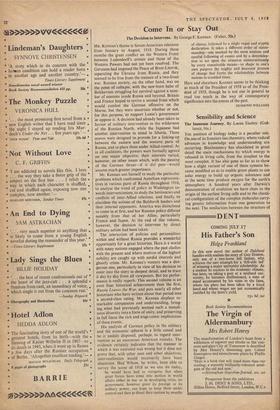Come In or Stay Out
The Decision to Intervene. By George F. Kerman. (Faber, 50s.) MR. KENNAN's theme is Soviet-American relations fl'om January to August, 1918. During these months the great conflict on the Western Front between Ludendorff's armies and those of the Western Powers had not yet been resolved. The Germans had imposed the Peace of Brest-Litovsk, separating the Ukraine from Russia, and they seemed to be free from the menace of a two-front war. Russian society, on the other hand, was on the point of collapse, with the new-born babe of Bolshevism struggling for survival against a num- ber of enemies inside Russia and beyond. Britain and France hoped to revive a second front which would combat the German offensive on the Marne, but they were uncertain whether or not, for this purpose, to support Lenin's government or oppose it. A decision had already been taken in favour of military intervention in the wilderness of the Russian North, while the Japanese had another intervention in mind in Siberia. These moves were designed to provide for a linking-up between the eastern and the western parts of Russia, and to place them under Allied control. As in all coalitions, the powers were formally agreed on one major objective; their interests varied, however, on other issues which, with the passing of the German threat—if it did pass—would assume much greater importance.
Mr. Kennan sets himself to study the particular problems which confronted American representa- tives in various parts of Russia throughout 1918, to analyse the trend of policy in Washington to- wards interventionism, to study the hesitancies and conflicts of inter-Allied relations, and finally to elucidate the actions of the Bolshevik leaders and their internal opponents. America was disinclined to come in at first, and her Russian policy differed notably from that of her Allies, particularly France and Japan. At the end of this volume, however, the decision to intervene by direct military action had been taken.
The interaction of policies and personalities within and without Russia provides a wonderful opportunity for a great historian. Here is a world with many nations engaged where the past clashes with the present and where motives of the highest nobility are caught up with sordid interests and ghastly crime. Mr. Kennan's venture was a dan- gerous one, particularly in view of his decision to enter into the story in deepest detail, and to trace it day by day from all viewpoints. But his perfor- mance is really superb. This second volume is an even finer historical achievement than the first, Russia Leaves the War, and puts nearly all other historians who have written about that period into a second-class rating. Mr. Kennan displays re- markable compassion and understanding, bring- ing what had previously seemed such a tumult- uous diversity into a form of unity, and preserving in full focus the rich and tragi-comic implications of these events.
His analysis of German policy in the military and the economic spheres is a little casual and he is unduly disposed, perhaps, to regard inter- vention as an enormous American mistake. The evidence certainly indicates that the manner in which it was executed was wrong but it does not prove that, with other men and other objectives, interventionism would necessarily have been disastrous. Had Wilson, he writes, been able to survey the scene of 1918 as we can do today, he would have had to recognise that when great forces have come into motion in world affairs either in war or in developing crisis, no government, however great its prestige or its military power, can hope to keep them under control and then to direct their motion by months of silence, followed by a single vague and cryptic declaration. It takes a different order of states- manship—one marked by the most anxious and careful following of events and by a determina- tion to act upon the situation unintermittently by every conceivable means—to shape to one's own purpose the mighty and incessant process of change that forms the relationships between nations in troubled times.
Here and elsewhere Kennan seems to be thinking as much of the President of 1958 as of the Presi- dent of 1918, though he is not one in general to read too much in the way of contemporary significance into the events of the past.
DESMOND WILLIAMS






















































 Previous page
Previous page